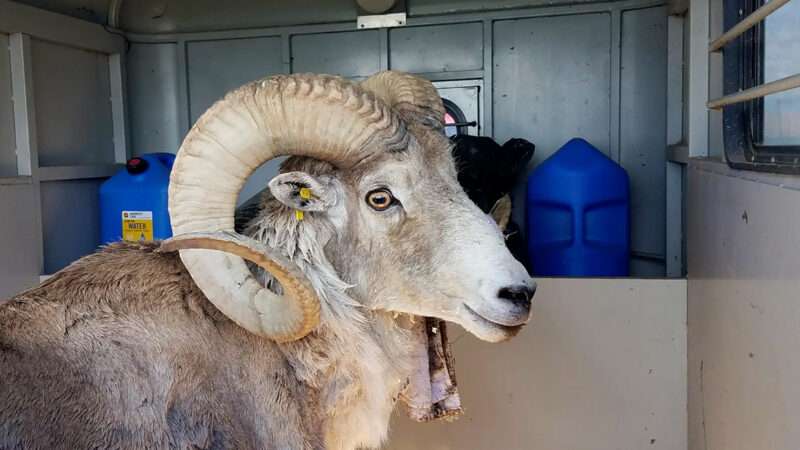
Montana rancher Arthur "Jack" Schubarth, 81, succeeded in cloning a wild Marco Polo argali sheep, the world's largest ovine species. That achievement cost him six months in jail.
The U.S. Department of Justice's sentencing memo asserts that the "Court can take a step towards averting the next ecological disaster and protect the public from wide-ranging negative consequences."
Did cloning a wild sheep really portend an ecological disaster or other wide-ranging negative consequences? Not at all.
Schubarth fell afoul of federal and state regulations that purport to protect rare wildlife from excessive exploitation. His son legally hunted argali sheep in 2013 in Kyrgyzstan, which issues a limited number of hunting permits annually. But his son neglected to fill out a U.S. Fish and Wildlife Service (FWS) wildlife import form that, among other things, forbids commercial use of lawfully hunted specimens.
Tissue from the trophy ram was sent to a cloning facility that turned it into 165 argali embryos. Implanted into domestic ewes, only one came to full term, on May 15, 2017. Schubarth dubbed the cloned ram "Montana Mountain King" (MMK). (The world's first cloned mammal was a sheep named Dolly back in 1996.)
Schubarth sold semen from MMK and bred him to other sheep with the goal of creating hybrids even bigger than wild argali. These big hybrid sheep could then be hunted on wild game ranches in the United States. Such domestic hunts could arguably reduce pressure on wild argali populations. Instead of celebrating his cloning breakthrough, however, the government is punishing Schubarth.
There is no denying that Schubarth violated various laws when he set out to clone argali sheep. According to the U.S. Department of Justice's sentencing memo, Schubarth conspired with others to illegally import, clone, buy, breed, and sell argali sheep in violation of the Convention on International Trade in Endangered Species (CITES), the Endangered Species Act (ESA), and Montana's ban on such sheep. He also falsified records related to the transport of prohibited species in violation of the Lacey Act.
Wild argali sheep, as noted in their CITES listing, are not presently threatened with extinction. A recent report finds that the wild argali population in Kyrgyzstan has increased since 2014 from about 15,000 to more than 21,000 (the total world population is around 75,000). Nevertheless, the FWS set aside the more lenient CITES designation in 2002 and listed argali sheep as "threatened" under the ESA, meaning that argali hunting trophies must obtain an import permit from the agency.
Additionally, in 2014 Montana put argali sheep on its list of prohibited species. But as the sentencing memo notes, Schubarth petitioned the Montana Department of Fish, Wildlife and Parks (FWP) in early 2014 to allow argali sheep into the state. It was not until 10 years later—on February 10, 2024—that the department got around to denying his petition. A month later Schubarth pleaded guilty to two felony wildlife crimes.
The FWP justified its ban by asserting that argali sheep might transmit disease to wild and domestic sheep and/or escape to establish feral populations. Both fears are highly unlikely. First, a single sheep derived from a cloned embryo is probably not carrying exotic diseases. The Justice Department memo claims that disease concerns are "not exaggerated doomsday predictions." On what grounds? The memo notes that two sheep from Texas, later sold by Schubarth to a rancher in Nebraska, died of Johne's disease—a contagious bacterial infection with no known cure.
Johne's disease is serious, and the interstate movement of animals that test positive for it is properly prohibited. But MMK was not the source of Johne's disease, which is already endemic in Montana. It is not likely that the two afflicted sheep acquired the disease at the Schubarth ranch, since the initial infection usually occurs early in life but manifests years later.
Secondly, since MMK is a very expensive and closely monitored stud animal, it is preposterous to suggest that he could escape into the Rocky Mountains to frolic with local bighorn sheep.
Schubarth did falsify transport records for shipping several MMK hybrids out of state and for bringing 74 and 43 sheep for insemination from Minnesota and Texas, respectively—but the Justice Department makes no claims that the prohibited sheep species caused any actual ecological or veterinary harm.
The U.S. attorney oddly asserted that "actions to create hybrid animals are as unnatural as they are illegal." Hybridizing argali sheep is not at all unnatural, since crossbreeding game sheep species is common in the industry. Some game ranches offer hunters the opportunity to bag Corsican sheep hybrids and Snow Urials (a cross between Texas Dall and Transcaspian Urial sheep). In fact, argali hybrids created during the 1970s are already hunted on numerous game ranches in Texas.
The feds confiscated MMK and killed his hybridized offspring at the Schubarth ranch. The feds will now likely go after the breeders in Alabama, Arkansas, Kansas, Minnesota, Missouri, Nebraska, Ohio, Oregon, South Dakota, Texas, and West Virginia to whom Schubarth sold argali sperm and hybrids.
The post A Rancher Cloned a Giant Sheep. The Feds Jailed Him for Allegedly Risking Ecological Disaster. appeared first on Reason.com.







